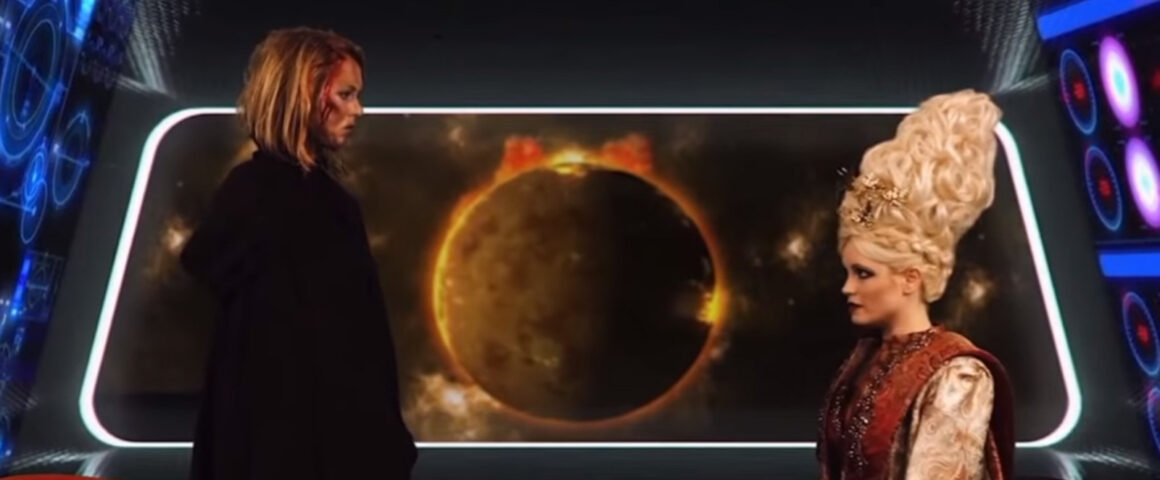Otherwise known as “Interstellar Civil War: Shadows of the Empire,” or “Star Warfare Rangers and the Cyborg Witch of Endor.” The final details are being nailed down as I type. The cut to which I was exposed was unfinished, with a basic sound mix and filler shots in place of what we assume will be sweeping CG battles. But nothing can rescue Interstellar Civil War: Guardians of the Future: An atrocious sci-fi monstrosity, even by the standards of Ed Wood-alike director Albert Pyun.
Explaining the plot is virtually impossible, and not just because it is an overstuffed concoction of names and codenames and alien planets with numbers in their title, but also thanks to Pyun’s and co-writer Cynthia Curnan’s insistence on needlessly chopping and switching the narrative chronology. “72 hours earlier” here, “58 minutes later” there, with no purpose or concept of flow.
There’s a character called Leah. There are people fighting with lightsabers. There’s a planet called Endor and a “religion of dark and light forces”. But it’s a galaxy far, far away from Star Wars. Closer, maybe, to a cheap-ass “Jupiter Ascending” with the enjoyable camp surgically removed; or an obnoxiously tone-deaf, knock-off “Dune.”
It starts with an astonishing opening crawl, replete with typos, which gives us an entire movie’s worth of backstory, explaining how the Imperial Empire has crushed the Rebel Alliance. Then a narrator presents yet more backstory. Grab a cuppa, folks — it’s five solid minutes from the beginning of the opening text to the end of that narration.
What it comes down to — I think — is a mission to rescue an Imperial ‘droid named Leah C6 (Cat Cakmis, “Bulletface”). She’s a creation of the Bu-tess, an all-female group of soothsayers who have been maintaining Imperial control for centuries. A spy amongst the enemy, Leah holds the key to destroying the rebels.
The rescue — a shockingly inept sequence which makes use of repeated footage and flipped frames (at one point an “Exit” sign is mirrored) — is led by Captain “Starslayer” Burk (Brad Thornton, “The Cursed”) and a small crew. But once Leah is rescued, Burk discovers a dark secret about the Bu-tess’ evil intentions. And in return, they will uncover an almighty secret about Burk.
Honestly, I wrote constant notes, desperately trying to keep up with the plot. But by the time you think you have a handle on what the “Litigation” might be, you’ve forgotten who this Hans Tremolo guy is (Daniel Faust by the way). The one time when I felt a real connection with a character was when the Bu-tess leader says, “This is getting too complicated.” That was 11 minutes in.
The omniscient Bu-tess, who are all about maintaining order and “purity of code” and have the advantage of seeing the future, are bafflingly inept. They are presented in a series of outrageously ponderous dialogue scenes; like the gods of “Clash of the Titans,” minus the fun. In fact, the entire script is an interminable stream of blunt exposition, whether it is characters describing stultifying political machinations or explaining each other’s motivations.
If only there were more laugh-out-loud lines like, “Murdered? I don’t like the sound of that!” But no, it’s almost entirely desert dry, delivered like a first reading, coming off like the political discourse scenes of the “Star Wars” prequels stretched to 100 minutes.
That it has ambition only compounds the crime. To say that Interstellar Civil War: Guardians of the Future reaches beyond its remit is an understatement. Amongst Burk’s squad is Sergeant Katz (Paul Gunn, “Killers at Play”), who describes in horrible detail a sexual assault and the murder of a baby. Suddenly the movie is no longer a dumb space opera to be mocked, but a wannabe study of wartime guilt.
Virtually nothing is filmed on location and virtually everything is virtual. Maybe the Babylon 5-level CGI will improve with the final edit. But some things can’t be fixed, like Pyun’s am-dram direction. Pyun arranges his perennially greenscreened characters with nary a thought for remotely interesting framing. I mean, we’re not asking for a deconstruction of classical mise en scene, but must you have all your characters standing in a uniform row, facing the camera? And why spoil Tony Riparetti’s half-decent “Mass Effect”-esque score with editing that looks like a scissors-and-Sellotape school project?
At least “Battlefield Earth” had some funky Dutch angles and John Travolta with owl eyebrows. It is particularly disappointing that Interstellar Civil War: Guardians of the Future comes from a director who once showed, with films like “Dollman” and “Cyborg” (also involving a super-soldier rescuing a robot), that he could construct vaguely enjoyable sci-fi trash. But his latest opus is an unrelenting, overlong, incompetent, deathly dull slog through the detritus of cinematic malpractice. It’s a war crime.




'Movie Review: Interstellar Civil War: Guardians of the Future (2017)' has no comments